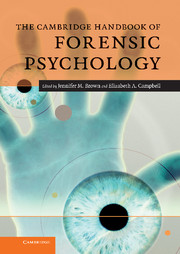Book contents
- The Cambridge Handbook of Forensic Psychology
- The Cambridge Handbook of Forensic Psychology
- Copyright page
- Dedication
- Contents
- Figures
- Tables
- Contributors
- Acknowledgements
- Forensic psychology:
- Part I Psychological underpinnings
- Part II Assessments
- Part III Interventions
- Part IV Psychology and criminal behaviour
- Part V Psychology and civil law
- 5.1 Assessing and reporting on work-related stress
- 5.2 Asylum seekers and refugees
- 5.3 Consent and capacity in civil cases
- 5.4 Discrimination and employment tribunals
- 5.5 Personal injury
- Part VI Special topics
- Part VII Professional practice
- Part VIII Research practice
- Author index
- Subject index
5.2 - Asylum seekers and refugees
from Part V - Psychology and civil law
Published online by Cambridge University Press: 06 July 2010
- The Cambridge Handbook of Forensic Psychology
- The Cambridge Handbook of Forensic Psychology
- Copyright page
- Dedication
- Contents
- Figures
- Tables
- Contributors
- Acknowledgements
- Forensic psychology:
- Part I Psychological underpinnings
- Part II Assessments
- Part III Interventions
- Part IV Psychology and criminal behaviour
- Part V Psychology and civil law
- 5.1 Assessing and reporting on work-related stress
- 5.2 Asylum seekers and refugees
- 5.3 Consent and capacity in civil cases
- 5.4 Discrimination and employment tribunals
- 5.5 Personal injury
- Part VI Special topics
- Part VII Professional practice
- Part VIII Research practice
- Author index
- Subject index
Summary
- Type
- Chapter
- Information
- The Cambridge Handbook of Forensic Psychology , pp. 588 - 595Publisher: Cambridge University PressPrint publication year: 2010



